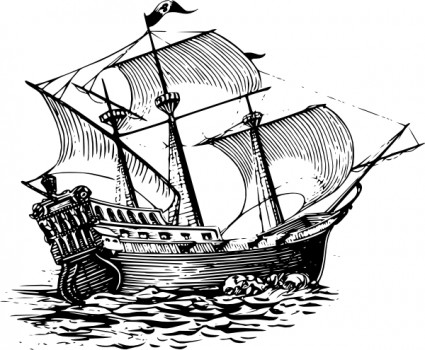 http://all-free-download.com/free-vector/download/galleon_sail_ship_clip_art_19496.html http://all-free-download.com/free-vector/download/galleon_sail_ship_clip_art_19496.html 9-13-15 James 3: 1-12 Steve Garnaas Holmes, www.unfoldinglight.net … [What} St. Paul calls “the flesh”…. doesn't mean our body; he means something even smaller, contained within our body, limited by our fears and appetites. But we aren't such little “selves.” We are part of something infinite. By the life of Holy Spirit in us we are members of the infinite Body of God, who dwells in us and we in God. ……..To “deny ourselves” is to deny whatever fears keep us from loving fully. It is let go of our self-centeredness, to say no the illusion, to transcend our ego, to abandon our little skull-caged, death-leashed bit of fear and desire and instead become the infinitely alive and loving children of God we truly are. As those who embody God's love we give of our lives for love; we are not afraid even of death, because we trust that with love and grace God overabundantly renews life in us. So we follow Jesus out of our selves and into infinite life: without fear we take up our cross, practice compassionate self-giving and join Jesus in loving the world into its newness. Its not surprising that my “self” so often feels very small. Our lives are ever more broken down into little bits. Maybe it’s the natural outgrowth of the industrial revolution. When every second counts, for efficiency’s sake, and measurements can now be taken in angstroms, 10 miliion ties smaller tha a millimeter. We record our lives in little bits- pixels and code. The new version of the i-phone 6 previewed this week, to great excitement, will snap images in 12 megapixels. I can remember being thrilled with my new camera that snapped shots at 4 megapixels. Small has never been so big! Nanotechnology Sound bites Digitally preserved moments But what does it all mean? Little bits, images and texts, of our lives are floating somehow in a cloud, that’s not a cloud. It empowers us and also makes us vulnerable, as we saw across Central Maine this week with intimate selfies being hijacked and displayed on a hackers webpage. Or the recent exposure of an extensive on line network designed for cheating on one’s partner. Its tempting to have just one more little …. Cup of caffeine Drink Cigarette, page of porn, pain pill, shopping trip….. whatever my addiction is. What ever creates a buffer that feels like it protects my little self. A little can go a long way. A little yes A little no. What does it all mean? I think it means that the horizon has never been so important. Did you ever spend a summer day as a child, or with a child, carefully constructing a little paper boat, or maybe it was leaves and sticks, to float on your neighborhood pond? Its possible to loose track of time completely as you puff a little wind into the sales, sending the boat on a meandering course. There was always one in the group, though, who knew where they wanted their boat to go, who found a point on the horizon and did their best to marshal their craft, puffing purposefully, sometimes resorting to a stick. When we lose track of the horizon in daily interaction with other people, our words sometimes fly like random shrapnel. One of my friends, a writer, librarian, and linguist's daughter, once told a group of teens who were becoming careless about what words they dropped and where, about her best remembered lesson in language. She had reached that age, around 11 or 12, when our sense of self stretches to try to fit the world we are discovering around us. One day, picking up a phone call from a friend, she stretched the cord (remember those?) around the corner in search of the privacy a tween must have when talking on the phone to a friend. Her father, reading in his rocking chair in the kitchen, could hear every word. But she was under an illusion of privacy. Midway through the conversation, she decided to drop the “f-bomb” to demonstrate her sophistication and social maturity. After she hung up, and came back around the corner, her father gently invited her to sit down. Every little cell in her body went on high alert. She knew she was busted. For the next half hour, Dad proceeded to give her a detailed etymological lesson in the history of the word she had used, working chronologically back to its origins in early English, when it described particularly violent acts against women. When he was done he leaned forward and asked her, “now, was that what you meant to say?” When we have our eyes on the right horizon, certain little bits rise in importance while others diminish. A parent’s love and regard becomes more important than impressing a classmate. Taking care of our minds, bodies, and spirit becomes more important than what ever it is we are craving at this point in time. Yesterday at the Topsham Waste Management Facility, (what I call the Transfer Station, what some of you may call "the Dump,") which is one of my favorite places to go though I admit I don't enjoy the smell in my car on the way there, I watched one of the staff, a great tall man in his orange safety vest finishing a long day of hard work, take the time to bend done next to a young girl and try to help her figure out how a bicycle, leaning against the wall of the “take away” section, might work for her. He didn’t have to do that. That he did was an act of grace. He might or might not have called it that himself, I don’t now. But he made my community a better place when he could have just been marking time to the end of the work day. She didn't appear to be a child who had many other options in obtaining a bicycle. His choice gave his work meaning far beyond his paycheck. He was keeping his eye on the horizon. Germany this week made the staggering decision to absorb up to 800,000 Syrian immigrants into their cities, villages, and country sides. My word! What an immense and difficult decision. Their leadership has their eye on a horizon that they have learned the hard way, from history, is absolutely essential. In that intimidating mass of 800,000 are little bits of individuality who are people, just like you and me. Have you stopped to think where you would go? If your world was torn apart and your home was no longer safe, where would you go? Who would help? What little things might start to matter. What does a mobile phone mean to someone who now owns only what they can carry? -connection to family? -tool for moving into a better future? -information about where food and water are available? -Where the greatest danger is? In 2005, the Katrina/ Rita double whammy displaced 1 million in the US. It began with Meteorological left-overs, an interaction of a tropical wave and the remains of a tropical depression, small droplets of moist warm air being drawn up into the air by wind. 9-11 inspired more individuals, little individual bits of humanity, to make heroic decisions than perhaps any other event in my generation’s living memory. In the air that day, and on the ground in the days after, people stopped what we were doing and made decisions about what gives our lives significance. We made choices about how we want to spend the finite days we have on this earth. Many began to measure our lives differently. Our horizon shifted. Last Sunday, as we were returning from Waldoboro, Jeff and I watched the end of the Brunswick Air Show right there before us in in the sky, on I295. Spectacular demonstrations of skill unfolding before us. I’m glad he was driving! A couple of days later the Times Record ran a letter about havoc created by guests on their hosts lawns: fencing sections toppled over, piles of trash left behind, rude responses to requests to respect the property. My automatic pilot kicked in. “Tsk, tsk, tsk- those people…” And then, perhaps it was this study of James that we are undertaking together, my horizon shifted. And I started to wonder what would happen if for the next show, in 2017, some of us from this church grabbed a bunch of trash bags and went out and offered to collect “those people’s” trash, and maybe hand out some bottles of water on a hot day. I don’t know if it would make a difference to them. I know it would make a difference to me. About 10 years ago you helped set the horizon for a fantastic group of young people, one by one, as they were baptized. The little things you do this year to support them in the important phase of their faith journey that we call confirmation, will go a long way to keeping them on course to live God shaped lives. In the biblical world that pokes, prods, and caresses us toward a God’s eye view, each “Self” is unique and united toward a sacred horizon. Navigating toward that shared horizon begins with such small things, the lifting of an anchor, the turn of a rudder into the wind, an invitation to join the crew, raising a sail to let the Sprit breathe us toward grace. Memory verse: Consider ships: They are so large that strong winds are needed to drive them. But pilots direct their ships wherever they want with a little rudder. – James 3: 4 St. Francis-When you are proclaiming peace with your lips be careful to have it even more in your heart.
1 Comment
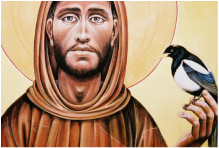 http://wp.patheos.com.s3.amazonaws.com/blogs/christianpiatt/files/2012/07/FrancisOfAssisi.jpg http://wp.patheos.com.s3.amazonaws.com/blogs/christianpiatt/files/2012/07/FrancisOfAssisi.jpg Francis was a bad boy. You probably know the kind I mean. You’ve probably met the kind I mean. Some of you have probably BEEN the kind I mean. He was wealthy. He was “high spirited.” Francis was one of those slight and not physically strong boys who makes up for it in charisma, gathering lots of friends with his sense of adventure and his ability to fund it with Daddy’s allowance. He was the kind of boy who stays out late at night finding all the fun there is to be had, the kind that annoys law abiding citizens. Francis was a “boys will will boys” kind of bad boy. The kind that gets carried away and finds themselves on the front page when things go too far. His future was set. He would carry the family textile business to the next level, cementing its connections with the families of those other boys around him. It was only expected that he would test himself by going off to war when his city came into conflict with another. So Francis picked up the weapons of war and went off to be a soldier. He was a prisoner of war for a year before Dad heard about it and sent money to bail him out. Give Francis credit, he didn’t run right home. No, it was on the way back to battle that he had the vision that turned him around. (Did you know that ‘repent” means literally to turn around?). The vision sent him down the road to home, not because he was afraid of fighting, and not because he missed the comforts of home, but because Francis caught a vision of something more valuable, or because a vision of something more valuable caught Francis, he turned toward home looking for God. He ran away from it all: The war The late nights with the boys His father Pietro’s plans. Francis was a kind of reverse prodigal. While he was running toward home, he was moving away from what home expected of him. When he got there, his frustrated father didn’t know what to do with this turned around son. So he put him to work as a shop boy instead of bosses' apprentice.p This made it easier for Francis to sneak out and try to follow where the vision led him. He went to the corners of the town that he used to pass by with his friends (or stop just long enough to poke fun). He looked for the widows, the orphans, the poor, the abused. He took the stories and teaching of Jesus very seriously. This was not what his father had in mind when he bailed his son out. One day Francis came on a small stone church that was falling down. It was a time when money was flowing in other directions, not toward the once proud churches that held the community together. The priest was doing his best, but just couldn’t seem to find a way to pull it together, literally. (Pastor are rarely if ever called and equipped to save a church alone). Francis thought about the priest’s predicament and came up with a clever solution. He simply walked off with one of the valuable bolts of cloth from the family shop, where he had ready access, and sold it for a tidy sum. Which he then ran back and attempted to deposit in the priest’s hand. The priest, being older and wiser, and knowing the reputation of Francis’ father, refused to take the money. When a crestfallen Francis returned home working on plan B, his furious father had a plan of his own. Tired of the escalating conflict between them and accusing his son of theft, he brought him to trial in the town square. There must have been quite a crowd in the center of Assisi that day, watching the golden boy brought to ruin. Francis, forced to return the money he had creatively “found,” and disowned by his disgusted father, gave it all back to his dad that day. He stripped the clothes from his back and strode naked from the square. Wealth was his greatest challenge, the obstacle that stood between him and his vision. So he chose poverty. He became “the poor idiot” free to follow the vision. Francis of Assisi (I suspect you’ve already figured out who I’m talking about) would name one other event as a defining episode in his life. As he continued to try to live the life that Jesus led he grew more confident and comfortable in the presence of the poorest of the poor, angry at their conditions, but able to be with them. Until one day he came upon a fear that lay hidden deep with in him. In those days, lepers, covered with ugly skin lesions, lived on the fringes of society as untouchables. Decent folks had a visceral aversion to encountering them. At his heart, Francis was the child of a decent, emerging upper middle class home. When he came face to face with a leper one day, Francis came face to face with the part of him that put the brakes on. But to follow the vision, a vision of God’s world where all are beloved and of value, Francis had to move forward. The day he emptied his pockets into the leper’s hand but was not satisfied with the economic exchange, the day Francis leaned forward and kissed the leper, was the day God's vision opened up for him completely. What was your greatest challenge this week? Mine was setting up a new laptop- time consuming, aggravating, a revelation of my own ignorance and impatience. What was yours? Francis had lots to choose from: His old friends acted as if he didn’t exist once the money dried up. His father disowned him. His poor health made it difficult to live as a poor itinerant preacher. His growing followers tried to make him into someone he wasn’t meant to be. But the challenge he chose to face was kissing the leper with the peace of Christ. Choose Your Challenge Choose Your weapons (Ephesians 6: 10-18) James chose to wild the sword of truth against arrogant privilege and callous injustice Francis-poverty against the pitfalls of wealth  http://www.gardenista.com/posts/10-easy-perennials-for-the-seaside-garden http://www.gardenista.com/posts/10-easy-perennials-for-the-seaside-garden John 6: 52-69 Intro to the Gospel Reading: The crowd is wary of Jesus, afraid of being taken in. But Jesus himself wants is to be taken in, literally, to become part of each person’s life, theirs, yours, mine. Listen for the beginnings of the early church’s practice of Holy Communion in this passage. Morning Message Jenny and Joe met later in life than some. They were old enough to have grown comfortable in their own habits and to recognize, in each other, a good fit. Together they found a darling little cottage steps from the sea with barely enough room for two adults. Which was perfect as they intended to spend every possible moment outdoors reclaiming a garden overgrown with beach roses and field iris. They had no longer gotten the furniture into their one-bedroom bungalow, arranged Jenny’s fragile antique tea cup collection on its open shelving, and carved out just enough corner space to accommodate Joe’s longed for wood stove, an indulgence for two adults who knew not to touch “hot,” when Joe came home one afternoon to find Jenny utterly distraught. She was laughing. She was crying. She couldn’t get ahold of her words. My dear, murmured a perplexed Joe, What is the matter? We have everything we’ve dreamed of. I…….I….we…. baby, Jenny finally managed to get out. The beloved author C.S. Lewis once wrote, imagine yourself as a living house. God comes in to rebuild that house. At first perhaps you can understand what God is doing. God is getting the drains right and stopping the leaks in the roof and so on. You know that these jobs need doing and so you are not surprised. But presently God starts knocking the house about in a way that hurts abominably and does not seem to make sense. What on earth is God up to? The explanation [Lewis continues] is that God is building a different house from the one you thought. –Throwing out a new wing here, putting on an extra floor there, running up towers, making courtyards. You thought you were going to be made into a decent little cottage. But God is building a palace. God intends to come and live in it himself. –Mere Christianity Every one who earnestly and whole heartedly tries to follow God, to listen and to follow, to see and to follow, comes to a point in the journey where the next step feels uncertain, unexplainable, dangerous, new. We find ourselves “out there,” on a limb. God takes those mind blowing opportunities to breathe more love into our lives that we think we can handle. If you’ve ever raised a special needs child, then you know something of this. If you’ve lost someone you love and to learn to love all again, or in a different way, then you know something of this. If you’ve ever heard Jesus ask, “Do you want to be healed,” and answered, “I do,” then you know….If you’ve ever caught the tail of an impossible dream and let it shake you…..if you’ve ever said, “yes,” to a ministry where you knew you were in over your head…..then something in you is nodding right now. Every crack and crevice of your life is an opening for God’s love to make itself known and to enlarge your self, your love carrying capacity. Its hardest when we think we have an airtight plan for our life, when we want, oh how we want, to hold onto what we have figured out, tested, decided we can trust. Jesus was speaking to a crowd who had a pretty firm grasp of who God was and how God worked. At least how God worked in their ancestor’s lives. They knew the stories by heart. They sang the beautiful songs they had heard their grandparents sing. They knew the laws by rote and thought carefully about specific applications. It was just that….something seemed to be different in their own time. And the more “different” things around them felt, the more they clung to what they knew, what they had inherited. Grandfather’s prayer shawl was more precious when a soldier had ripped your own from your head. The way mother intoned Shabbat prayers felt more and more the right way when they heard the same words pronounced with so many strange accents in the temple. A few weeks ago my sister in law was visiting from RI. We decided to show her how lovely Bath, ME is during its summer festival. Walking up the main street, we saw the antique auto show finishing up. Now one of my deep and mysterious family stories is about the Wheeler run-about, invented in 1900 by my Great Grandpa Wheeler and his father. They only made three. East Coast investors were particularly excited about the horseless carriage idea, so the industry developed in Midwestern towns more willing to take a risk (and with more straight and open roads). #3 (1902) ended up as parts in the family barn. #2 (1901) wore out from weekend excursions. Granma had lost track of #1 until she saw a newspaper article about the fire in a New Hampshire collector’s barn. He was most devastated by the loss of his beloved Wheeler run-about. Grandma tracked down his phone number form the reporter, called him up, and asked if he’d like the parts from the barn. The delighted auto collector took her up on her offer and gave her a ride in the beautifully restored car each year for her birthday. The photo she kept in her den showed a ruby red gem. Grandma aged, had a stroke, died. No one had any idea where the car was. But the Wheeler run about was an enticing mystery. I poked around on the internet a bit and found historical references to it, but no current information. So when I saw a really old car in the Bath show I thought, it’s a long shot, but who knows. I asked the first guy leaning back in a folding lawn chair if he he knew anything about really old cars. He did. In fact that was his pride and joy sitting in front of us. “How would you find a really old car,” I asked. He said there was a special registry for pre-1918 gas automobiles, got my story and said, ‘well, if I have a chance I’ll try to look it up.” This was Sunday about 5:00 PM. On Monday morning, I opened my laptop to check my email and there it was: name, phone number and Texas address for the current registered owner of the Wheeler roadster. It got me thinking on what I knew about Great Grandpa’s early gas combustion engine from the patent photo. Then I thought about what I drive, my 2013 Prius. The Wheeler roadster’s owner’s manual wouldn’t help me out much when I look under my hood. And While I feel certain that Grandpa Wheeler would by fascinated with a hybrid motor, I’m pretty sure that my owner’s manual wouldn’t have done him much good either. In the crowd around Jesus that day, a sorting was taking place. Who will follow the trail of love as it walks right by them? Who will step out into that unknown space where the promise of God’s love is the one sure thing you can rely on, and you’re not quite sure what that love will look like or where it will take you, what it will feel like or what direction it will come from. It was then, as it is now, a disruptive age. When love reasserts itself in the midst of confusion, and wants to widen our spirit without a complete up to date owner’s manual, how do we find clarity? -Stick with Jesus. He knows where we’ve been, where we are, and where we’re going. -Hold yourself open to possibility, heart, mind and soul. -Claim God’s gifts The particle physicist and educated Jewish man, Edward Teller is credited with these words (they hang in my office), when you have gone as far as all the light you know, and you are about to step into the darkness of the unknown….faith is knowing that one of two things will happen. You will step onto firm ground. Or you will learn to fly. Some do choose to walk back into the light of what they already know. Some spend days, weeks, years, clinging to the edge where known meets mystery. If you would grow deep and wide enough for God to make a home in you, trust that even as your mind is being blown, love will be made known.  2-15-15 “More Than Possible” (Worshp resources available here.) When we loosen our grip on what we think must be, God finds space to infuse our lives with more than is humanly possible. 2 Kings 2: 1-12 Mark 9: 2-9 Daddy and his daughter were spending a quiet day at home. But daughter was getting a little bored. So Daddy asked his little girl whether she’d like him to draw a nice picture for her. “Yes,” she says, “God.” After a moment of silence Daddy answered, “How about a nice cow falling off a cliff.” Both of our biblical stories today are close encounters with the indescribable: a living Elijah lifted to heaven; Jesus’ getaway guy-time unexpectedly meets up with God servants from centuries before. Their closest followers watch. Elisha holds onto his reality with a tight grip. Awestruck, Peter, James and John think they might be loosing their grip on reality. Peter, man of action, is the first one to try shake the confusion off. I’m seeing something awesome. What does this have to do with me? Peter tries to connect with what he’s seeing. He decides to offer a service but wants more than is humanly possible-to hold onto the moment he’s in without moving on. He mobilizes back toward the reality he knows. Which makes him imminently loveable, because we recognize that impulse, don’t we? J When Peter speaks up, God immediately cuts off Peter’s words and his intended action. At least Jesus’ sidekicks don’t try to explain what’s happening like the bystander prophets in Elisha’s experience. Youtube, advice columns, and blogs are full of attempts to explain: What Tolkien’s one ring really means. Why we feel a certain way. What we should do when someone hurts us, or helps us. We don’t hear a word Jesus says a word in this passage, though we know Jesus is talking with Moses and Elijah, we don’t hear a word he says. This passage is not about teaching. It’s about being. Its tough trying to figure out how to enter the stories we bear witness to. We want to create pedestals for those who inspire us. I think of Brian Williams trying to find his way into being part of the stories he covered. I think of the way others grabbed onto young Alex Malarkey’s story about a trip to heaven and back and made it into the best selling, “The Boy Who Came Back From Heaven,” even while Alex and his Mom kept trying to say, “it didn’t happen like that. I think of Bill Cosby and how hard it was for those who saw what was really happening to figure out what to do about it. When we try to grab onto the moment and preserve it the way we want it to be, our tight grip ends up breaking things. Thank God, that opens up space for God to work healing. But maybe we don’t have to break things. Our blessing this morning is seeing Elisha, Peter, James, and John in the grip of soul moments. How can Elisha and Peter convey their experiences to others without sounding like they’ve lost their grip? Maybe they can’t! But they can describe the way their hands gave up tight grips and opened to receive and to give out of the marvelous, mind blowing mystery of God’s active presence. They can live into that presence in ways that honor and extend the best work of those who taught them. Teetering on the edge of the reign of God, they can take the plunge into God's purpose. So can we. We can push the pause button on our need to get a grip…..look around……check out what God is really doing…..let ourselves be a little helplessly awestruck before we swing into action. If we do, we’ll find that God has more in mind for us than is humanly possible. 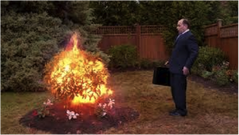 Exodus 3 &4 Matthew 16:21-28 Moses has been born when a king was declaring, “kill all the male Hebrew babies;” the infant hidden by his resourceful mother in the bullrushes of the Nile river, adopted by one of the king’s own daughters, and raised in a household of the ruling class became a man between 2 peoples. At some level his Hebrew identity endured. Moses' "hebrewness" broke out into the open in rage when one day he saw Hebrew construction workers being whipped by their boss pushing them beyond the limits of their capacity. Moses promptly, if not intentionally, killed siad boss, forcing him to flee Egypt, to leave behind the peoples he lived between, Hebrew and Egyptian. Scroll forward a bit and we find Moses married into a Midianite family, shepherding his father in law’s sheep. On this day, a new day …. he led his flock beyond the wilderness, and came to Horeb, the mountain of God. There the angel of the LORD appeared to him in a flame of fire out of a bush; he looked, and the bush was blazing, yet it was not consumed. Put yourself on that mountain. Close your eyes. Set aside the seeing for a moment. What do you hear? Crackling sparks Baaing lambs Grazing, shuffling sheep Perhaps a hawk's wing or call Wind silence "Moses, Moses!" God called to him out of the bush, And he said, "Here I am." Then God said, "Come no closer! Remove the sandals from your feet, for the place on which you are standing is holy ground." …."I am the God of your father, the God of Abraham, the God of Isaac, and the God of Jacob." And Moses hid his face, for he was afraid. Moses says: I am here. God says: I am God. …. the LORD said, “I have heard my people’s cry …..and I have come down to deliver them….. and to bring them up out of that land to a land flowing with milk and honey The cry of the Israelites has now come to me….. This story began when GOD heard. It continues as Moses is compelled by what he hears and sees, and perhaps by a readiness to hear that is trying to bubble up in him. So come, I will send you to Pharaoh to bring my people, the Israelites, out of Egypt." But Moses said to God, "Who am I that I should go to Pharaoh, and bring the Israelites out of Egypt?" This story began when GOD heard. But it almost ended with Moses’ answer! "Who am I?" I’m nobody, I disappeared from Egypt; my escape clause is only good if I’m out of sight, out of mind. (touch finger to nose) Not ME, God! [But] God said, "I will be with you; and this shall be the sign for you that it is I who sent you: when you have brought the people out of Egypt, you shall worship God on this mountain." Then the question and answer session begins. God tries to light the fire in Moses’ heart while Moses keeps clicking back questions. Who am I? Who are You? What if they don’t believe me (remember, I’m safely nobody) What if they ask me who you are (remember, I don’t know who you are!) What if I can’t find the right words? It reminds me of a stuck lighter. Click. Click. Click…..will this thing ever light or won’t it? Who are you, who am I, listening to this story today? -Nobody (not me)? -or somebody with their heart ready to be set flame? Like Peter in Matthew’s story this morning, Moses tries to throw up a shield he can hide behind. Do you remember how Jesus answered Peter? …you are setting your mind not on divine things but on human things…..if you want to save your life you must lose it, for me sake. Jesus' words must have terrified Peter. What do you think Moses was afraid of? What about you? Are you firing back empty clicks or open to God’s igniting flame? We see the flickers in such unexpected places. One of our United Methodist Pastors, Rev Cecil Williams, eulogized Robin Williams 2 weeks ago. [1] Since then the stories just keep coming. These are from Facebook. Tina Pasquinzo we in SF knew what a great guy he was, he would always stop at a school car wash, ask the students what school are they from, what are they raising money for? then would pull out his wallet and tell the kids, "Sorry I don't have time to get my car washed but this is all the money I have in my wallet, good luck and study hard" or when he found out a neighborhood public school needed audio equipment for their run down auditorium, he quietly funded a top of the line sound system. Lindsay Rogers I met robin Williams a few years back after a tragic accident where I almost lost my life due to a drunk driver, I had a torn aerota and a fractured skull along with many other injuries and health problems, well I am still suffering 3 years later and it's hard for me to get out of the house and one of my friends knew how much I loved robin Williams and said Lindsay I have a suprise for you, I wasn't feeling well but they came and kidnapped me.. We didn't have enough money to go and see the show but the gentleman told us that we might have a chance of catching him after his show, so while waiting for the show to end I was talking to one of the security guards who was asking me about my scars and couldn't believe my story and how lucky I was to have made it thru, anyways he goes excuse me I'll be right back.. A few minuets later a lady came out and said mister robin Williams would love to meet you, me and all of my friends look around like me? So I got to go in the building and meet him!! He was such a great guy, he said tell me more about your story he sat down we talked and he said don't ever be ashamed of your scars they are battle wounds and shows how strong you are, they turn into stars and you will shine so bright. I'll never forget that. ……. He kept in contact with me to see how my health was, so this hit close to home with me when I found out about his death. God bless you robin Williams. Anthony Murcia I met Robin Williams when I was a security guard at Metreon in San Francisco. I was escorting a homeless man out of the building and the homeless man told me, "all I want it a chance to work here." I told him look there are a few things you need to do first. Get cleaned up, shave, and find something decent to wear and I will put you in contact with HR. Then I heard a voice say, "is that true?" I turned around and it was Robin Williams. I was amazed and star struck. I said, "yes it is, if goes up there like that they won't take him serious." The next day the man came back and all cleaned up with a nice suit. I prepped him for HR and walked him up there. I never confirmed if Robin helped him but I am sure he did. A few weeks went by and I was working and heard, "hey Tony." I turned around and it was Robin. Robin said, "that was a nice thing you did, thank you." From that point on we carried conversation not as a fan to actor but as friends. He always used my name. I eventually moved on from that job and didn't see him anymore but it was an experience I will remember for The rest of my life. If I can help a homeless person I will. Robin told me, "it's not how Much you give or what you give they just want to feel like someone still cares." Great man, makes you feel comfortable, and he was just one of the guys. Thank you Robin Williams. Maybe Robin Wiliams had a heart aflame that lost its source of air. Certainly he's now in the care of a God who heard and saw the tenderness in his life. Pastor Steve Garnaas Holmes reflected this week: …….And God goes about God's passionate work: to deliver, to set us free from oppression, from fear, from death, from all that holds back our love from its freedom. No matter your struggles, your gifts, your hopes, there is this great energy of deliverance moving in this world, already at work to set you free, you and all who hope, who suffer, who are oppressed, who long for freedom, for peace, for the arms of the One who Hears. And you, what burning bush have you seen? What work are you doing, what energy are you following? How have you taken up your cross and followed the One who knows our pain, the one who hears, the One who delivers[2] Its been said that “The church doesn’t have a mission, God’s mission has a church.” The Christian walk doesn’t start with projects or principles, it starts with being present. “I am here,” so that we can hear God, “I am God…..so come” Try this listening practice this week. Just as Moses says: I am here, and God says: I am your God, Say to God, "Here I am," (just that, nothing more than "here I am), and listen for God's response, "I am your God." The Christian walk doesn’t end with fear or excuses. It journeys into wilderness and comes out more alive than when it went it. “So come” all you who are not nobodies, all you somebodies with hearts ready to be set aflame. Are you ready to hear? Are you ready to see? Are you ready for heart aflame and a bold purpose to your life? [1] http://www.ktvu.com/videos/news/robin-williams-rev-cecil-williams-remembers/vCnB5h/ [2] ? -Steve Garnaas Holmes, Unfolding Light 8-30-14 In 2011, when Journalist James Foley was held captive for 44 days by forces loyal to
Moammar Gadhafi in Libya, he prayed while imprisoned that his family, many miles away, would somehow know that he was safe. “Haven’t you felt my prayers?” Foley asked his mother, Diane, when he was finally allowed to call home. She responded that his friends and family had been praying, too, holding vigils filled with former professors, priests and Marquette students. She echoed his question back: Have you felt ours? He had, the journalist said. “Maybe it was others’ prayers strengthening me, keeping me afloat,” Foley later wrote. In 2012, the 40 year old Catholic was abducted again, this time by the extremist group ISIS, which calls itself the Islamic State and which has chosen an ends justify the means approach to creating a warped vision of the Ummah, or Islamic community. On Tuesday of this week, James Foley was killed. The man who killed him, said that Foley’s murder was payback for U.S. airstrikes that have helped drive ISIS from strategic cities and infrastructure in northern Iraq. Journalist Daniel Burke writes, The man in orange, kneeling. The man in black, wielding a knife. One asked God to cross the “cosmic reach of the universe” and soothe his family. The other claimed to kill in the "name of Allah, the most gracious, the most merciful." …..the contrast between the two religious paths - one led a journalist to cover conflicts, the other a jihadist to create them - is jarring. [1] Martin Marty, one of our most insightful living religious historians, observed, "It's story versus story…and the more you are threatened, the more dramatic and deep the story is going to be." In our stories, faith easily becomes an excuse for human goals. ISIS has bombed revered religious sites, murdered hundreds and tortured and enslaved many others – all in the name of building an Islamic state. (Burke) But faith can also be the reality check that provokes acts of kindness and campassion that reknit broken bonds. Foley's friends and family say his faith inspired a very different moral course. He organized fundraisers for slain journalists, taught convicts in Chicago to read, and risked his life to tell the stories of people living under the brutal rule of dictators. He was the kind of guy who always offered half his sandwick or cigarette, one friend recalled. The source of his unselfishness was clear, said Foley’s friends. "Jim's faith was something we all agreed not to discuss publicly while he was held in Syria,” said Max Fisher, “but it was the wellspring of his generosity." It’s a paradox of modern life - most of human history, actually – that saints and sinners alike draw from …. religious waters. (Burke) "It's story versus story," as Marty put it, "and you get rid of the bad ones by telling good ones." Exodus 1: 8-2:10 is just such a “story vs. story.” Now a new king arose over Egypt, who did not know Joseph. There's been a change in political leadership. With change is the danger or forgetting, forgetting lessons learned, forgetting friendships forged, forgetting what brought hope and life in the past. He said to his people, "Look, the Israelite people are more numerous and more powerful than we. Come, let us deal shrewdly with them, or they will increase and, in the event of war, join our enemies and fight against us and escape from the land." The king is conflicted, afraid they’ll fight us and afraid they’ll leave. What do the Egyptians need these Israelites for anyway? Are they a reminder that the ones who were here first are superior? Is it because we, oops-the Egyptians, need someone to exercise power over? Therefore they set taskmasters over them to oppress them with forced labor. They built supply cities, Pithom and Rameses, for Pharaoh. Are the Israelites needed to drive the economic engine but with their power firmly kept in check? It looks like defensive action, although no assault has taken place. What choice does the king have? So far this story reminds me of the run up to WWII in Europe. But the more they were oppressed, the more they multiplied and spread, so that the Egyptians came to dread the Israelites. Is this story starting to sound like the one playing out in the streets with yong black men? The Egyptians became ruthless in imposing tasks on the Israelites, and made their lives bitter with hard service in mortar and brick and in every kind of field labor. They were ruthless in all the tasks that they imposed on them. The king of Egypt said to the Hebrew midwives, one of whom was named Shiphrah and the other Puah, "When you act as midwives to the Hebrew women, and see them on the birthstool, if it is a boy, kill him; but if it is a girl, she shall live." But the midwives feared God; they did not do as the king of Egypt commanded them, but they let the boys live. So the king of Egypt summoned the midwives and said to them, "Why have you done this, and allowed the boys to live?" The midwives said to Pharaoh, "Because the Hebrew women are not like the Egyptian women; for they are vigorous and give birth before the midwife comes to them." The story's words so far have been oppress, dread, ruthless, imposed, bitter, kill. The words start to change when two new characters come on the scene. Its a pivotal moment. They herd the king but did not obey. To whom do the midwives owe the truth? With clarity in this moment comes salvation. They owe the truth to the one who give life, not the one who oppresses it. So God dealt well with the midwives; and the people multiplied and became very strong. And because the midwives feared God, he gave them families. Then Pharaoh commanded all his people, "Every boy that is born to the Hebrews you shall throw into the Nile, but you shall let every girl live." “Story vs. story.” One is a story of imploding control. One a story of expansive hope. Both contain an element of fear. Not only, who is feared, but also the quality of fear. The king fears his neighbors with a dread that surfaces his own lack of security. The midwives fear God with an awe that inspires. It looks like a clear cut case of the power of life vs the power of death. I would love to hear Carl Jung's take on the story. There is an element of archetypal male/female power. The male cannot give birth, but that doesn't mean that death is what male power is meant to be about, its archetypal purpose is to protect and sustain. But this king mistakes his power. The power of the midwives was assisting life and and assisting death, two movements of the Spirit through such similar portals into what is unknown before crossing. The king tries to force them into a warped choice of life or death. Friends, we are kings or midwives to each other. We are able to protect and sustain each other. We are able to accompany and assist each other on our life journeys and passages. We are able to the defensive fear that threatens life or the awesome hope that bears life. It was the king’s choice. It was the midwives’ choice. It is our choice. What story do you want to be part of? The midwives fit Pat Farrell’s description of “Weeds of Hope” ……in the face of all evidence to the contrary. Hope makes us attentive to signs of the in-breaking of the Reign of God. Jesus describes that coming reign in the parable of the mustard seed…. Though it can also be cultivated, mustard is an invasive plant, essentially a weed…. We can, indeed, live in joyful hope because there is no political or ecclesiastical herbicide that can wipe out the movement of God’s Spirit. Our hope is in the absolutely uncontainable power of God. We who pledge our lives to a radical following of Jesus can expect to be seen as pesky weeds that need to be fenced in. If the weeds of God’s Reign are stomped out in one place they will crop up in another. ( 2012 LCWR Assembly Address)
 Text: Genesis 29:15-28 Terrance Shulman studies the way over 10% of Americans get a rush: shoplifting. He’s found a string of commonly held beliefs among shoplifters: • Life is unfair • The world is an unsafe place • Nobody will be there to take care of me • Nobody's really honest • I'm entitled to something extra for my suffering • Nice people finish last • There's not going to be enough money to live • It's a 'dog-eat-dog world' out there In other words, , shoplifting is way for powerless to feel powerful. And, as with all addictions, the high gets harder and harder to reach. Getting something for nothing takes more and more work. Can you really get something for nothing? At the very least, a shoplifter gives up the ability to look the checkout person in the eye with integrity. I don’t usually get time to read the Sunday paper before church, but this morning a headline caught my eye: “Greed Before the Fall.” After a lifetime of craving recognition, of building a flock that showered him with cash and helped build a business empire selling everything from toys to ships, Mr. Yoo found his moneymaking machine brought more that his own undoing, prosecutors say. It also contributed to one of the worst peacetime disasters in the nation’s history-the sinking of the ferry Sewol in April, which killed 304 passengers, the vast majority of them high school students. It seems that in order to increase the profits for a power behind the scenes, the pastor of a 100,000-member church, the company added additional cabins and a marble laden art gallery, to appeal the clientele they most wanted to attract, on the upper decks. Then they loaded on so much cargo that it couldn’t be secured properly and intentionally drained the ballast water so that it would ride higher in the water. All of which made the boat hopelessly top heavy and vulnerable to the waves. It was a horrific realization of the prosperity gospel gone wrong. In one of their more damning findings, prosecutors say that so much money was being siphoned away from the ferry company to Mr Yoo and his family that it was starved of funds and spent only $2 last year on safety training for the Sewol’s crew members. The money went to buy a paper copy of a certificate. Can you really get something for nothing? Last week in Genesis we saw Jacob getting something, well, actually two somethings, for almost nothing: his father’s blessing and his brother’s birthright. Whereupon he promptly fled the scene. Today, we see Uncle Laban trying the same kind of tricks with nephew Jacob. It seems to run in his mother’s family. How much can he get out of his nephew? He puts a lot of mental effort into tricking Jacob. After all, you can’t get something for absolutely nothing, right? But Laban puts little physical effort into the wealth that accumulates from Jacob’s efforts. (Anita Diamont’s “The Red Tent” has a fantastic characterization of Laban.) Jacob, on the other hand, throws his heart, soul, and back into working toward his goal. Jacob is caught by cupid, He’s in love, he’s all shook up. Oscar Wilde used to say that “true friends stab you in the front." Laban is no true friend. He goes straight for the back. After seven years of service for the woman he loves, Jacob says, its time. And Laban throws a whopper of a wedding, showing his new wealth off to friends and family. (Isn’t that what weddings are for?). They party long into the night. The couple meets in their tent. Morning dawns…. and Jacob is appalled. It’s the wrong sister. “Oh, didn’t I tell you,” explains Laban, “we never marry the younger before the older. It just isn’t done. But have I got a deal for you. So Jacob gets a double wedding sandwich. Seven years of labor, seven days honeymooning with Leah. Seven days honeymooning with Rachel, his heart’s desire, and seven more years of labor. Jacob truly does NOT get something for nothing. He gives it everything he’s got. He does it because a seed was planted deep in his heart the first time he laid eyes on Rachel. He found his pearl, the treasure that carried God’s purpose for him and promise to him of descendents as many as the stars. And even though he doesn’t love her the same way, he also honors Leah. "The kingdom of heaven is like a mustard seed that someone took and sowed in his field; it is the smallest of all the seeds, but when it has grown it is the greatest of shrubs and becomes a tree, so that the birds of the air come and make nests in its branches." God gives something for nothing to each of us and all of us twice, once at our birth and once at our rebirth. Not one of us earns the right to be alive. Not one of us earns the right to receive new life in Jesus Christ. But not one of us lives if we do not care for these gifts from God. What is the seed God is planting in your life? One of Jeff and my worship experiences while in Cambridge this month was with the Cambridge Methodist Circuit. 26 people from churches in the circuit led worship as they celebrated completing the 34 week Discipleship Bible course. They were a varied group, from a curly haired young mother with her infant snug against her body as she read the Word, to an 80th something woman delighted to discover that God had new purpose and new gifts for her. We sang George Wallace Briggs rousing hymn, God is speaking by the Spirit, speaking to our hearts again; in the age-long Word declaring God's own message, now as then. Through the rise and fall of nations one sure faith yet standing fast: God abides, the Word unchanging, God the first and God the last. A number of the students shared answers to the question, “what challenged your faith to grow?” The late 30-something woman said, “it led me into parts of the bible I might never have read no my own or in worship…to ask questions never would have thought of, not necessarily answered during the course. The 80-something great grandmother thanked God for what she now felt newly called and gifted to do. The gay man in 40 year relationship seeking coherence of faith and life, found, and offered, the treasure of 1 Corinthians 12’s view of love. The 50 something witty guy who could have easily spoken all night and whose insight came in week 34 (the last session). God’s new Covenant, now it making sense and illuminated other parts of his life, like reading Wolf Hall’s debate on the bible. The 60-ish lady raised Catholic in a time very different from our poast Vatican 2 world, whose mother was appalled at the thought of reading the bible. Now that she was being told it was alright, where to start? Disciple Bible created order out of chaos. And the woman my age, who found the course dauntingly different from her college courses. This course challenged her to find the bible’s relevance for her own life. It struck me that their immersion in scripture was like baptism. God gives something for nothing to each of us and all of us twice, once at our birth and once at our rebirth, through Jesus Christ. These folks had taken the seed of faith and cultivated it, each in their own way, supporting one another in this season of growth. Did they get something for nothing? Yes, and they discovered it with a little work and a time commitment that seemed enormous at the start but a blink of an eye at the end. In their song, “Something for Nothing,” the band Rush sings, You don't get something for nothing You can't have freedom for free You won't get wise With the sleep still in your eyes No matter what your dreams might be True and not true. The seed of life is free. And the seed of faith, of rebirth, is free. And we are free to make of it what we will. Dig a LIttle Deeper: Many of us look at the children crossing our borders as trying to get something for nothing. The Rev. Juan Guerrero, Ph.D., is superintendent of the United Methodist Mission in Honduras Read about the children of Honduras in his words. Then ask: What are the roots of poverty in Honduras. Why are children leaving their country now? What's happening in our church, the United Methodist Church, in Honduras? How might God, who gives us and them, me and you, the free gift of life, invite us to help these children experience life as gift? |
Karen L MunsonUnited Methodist Pastor & Liturgical Artist Archives
September 2015
Categories
All
|
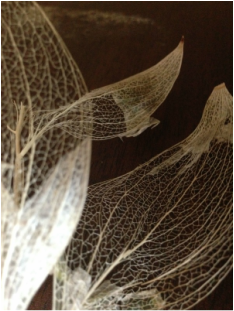
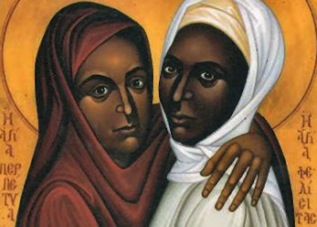
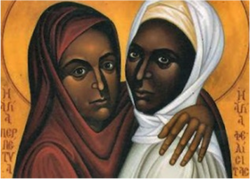
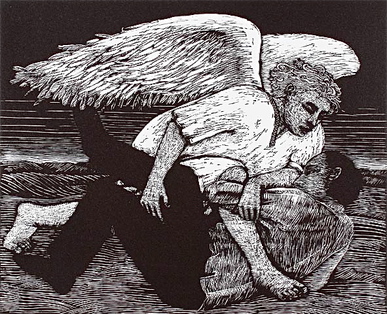
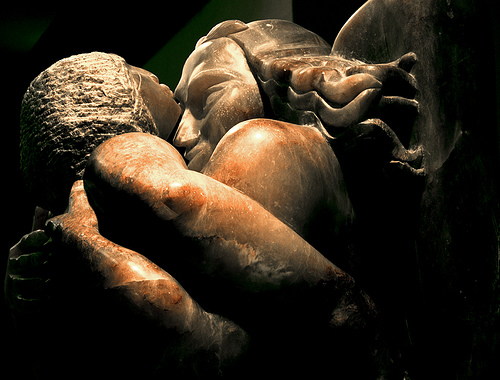
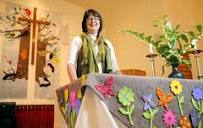
 RSS Feed
RSS Feed